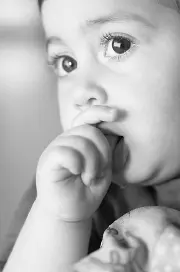
Separation Anxiety
by Greta Jenkins, Ed.D.
One-year-old babies often have contrary natures. Sometimes they scream and cry if you are out of sight for just few minutes. Other times they are just fine playing alone, while you to do your chores uninterrupted. This contrariness is due to the child's awareness of dependence on parents and the early stages of independence. By the time a baby is one, they know that parents are not just around to cater to their every whim. Parents are a safety net, people who watch out for and protect them from the unknown in the world.
Parents have to walk a fine line during this stage. You need to maintain the delicate balance between making sure your child feels secure, and helping your child begin down the road to independence. It is important parents tare not overprotective or unduly harsh. There is no exact formula, all children are different. Here are some tips to help you achieve this balance:
Don't sneak out of the house or out of the day care center. Your child may be okay once you've gone, but when you return, she will probably stick to you like glue, terrified that you will abandon her again. The child will become alert for the slightest indication that you may get up and leave. This will make the baby feel insecure.
Don't show hesitation or guilt when you leave. Children are very sensitive and will pick up on your feelings, making them feel that their fear is justified.
Play Hide and Seek with your child. Hide for a few minutes before reappearing. Lengthening the time you hide. This will help your child learn that you will return.
Take your child with you when you can. Don't worry it will not make they grow up to be "clingy". Children usually outgrow separation anxiety by age 3 or 4 unless they are facing a brand new situation such as a new day care center or pre-school. In addition, children can grow up to be solitary, introverted and "clingy" if they are not exposed to many people. It has been proven that children who are used to being around different people from a young age tend to be more independent and outgoing. Children who are brought up with love, care and attention from parents, grandparents, uncles, aunts and siblings, become confident, friendly and secure.
Tips for taking your child to daycare
Make a visual chart using phot's and small words. Go over the chartou leave the day before you go to daycare.
Bring the chart with you to drop off.
For example: Walk to to door Go inside Hang up your jacket/backpack and put your
shoes away Give mommy one hug. And this is the important part. It will
be hard because she might cry, but stick to the routine.
Kids crave routines and overtime, it will get better. Make sure to tell her you
love her and reassure that “mommy will always come back to pick you up.”
Wave bye, and walk out. Include her in the chart. You can point to the
picture and say, “what do we do next?” Narrate for her. “We are walking
to Auntie’s house.
What should we do next? That’s right! We knock on the
door. Let’s knock together!”
Greta Jenkins Ed.D.
Greta is an educational psychologist, parenting expert, artist and author of “Do siblings influence one another?
Follow her on Facebook @Adviceandinfo. More about Greta Jenkins, Ed. D
Language Development
Potty Training
Why Won't My Toddler Eat?
Preventing Sibling Rivalry
|



